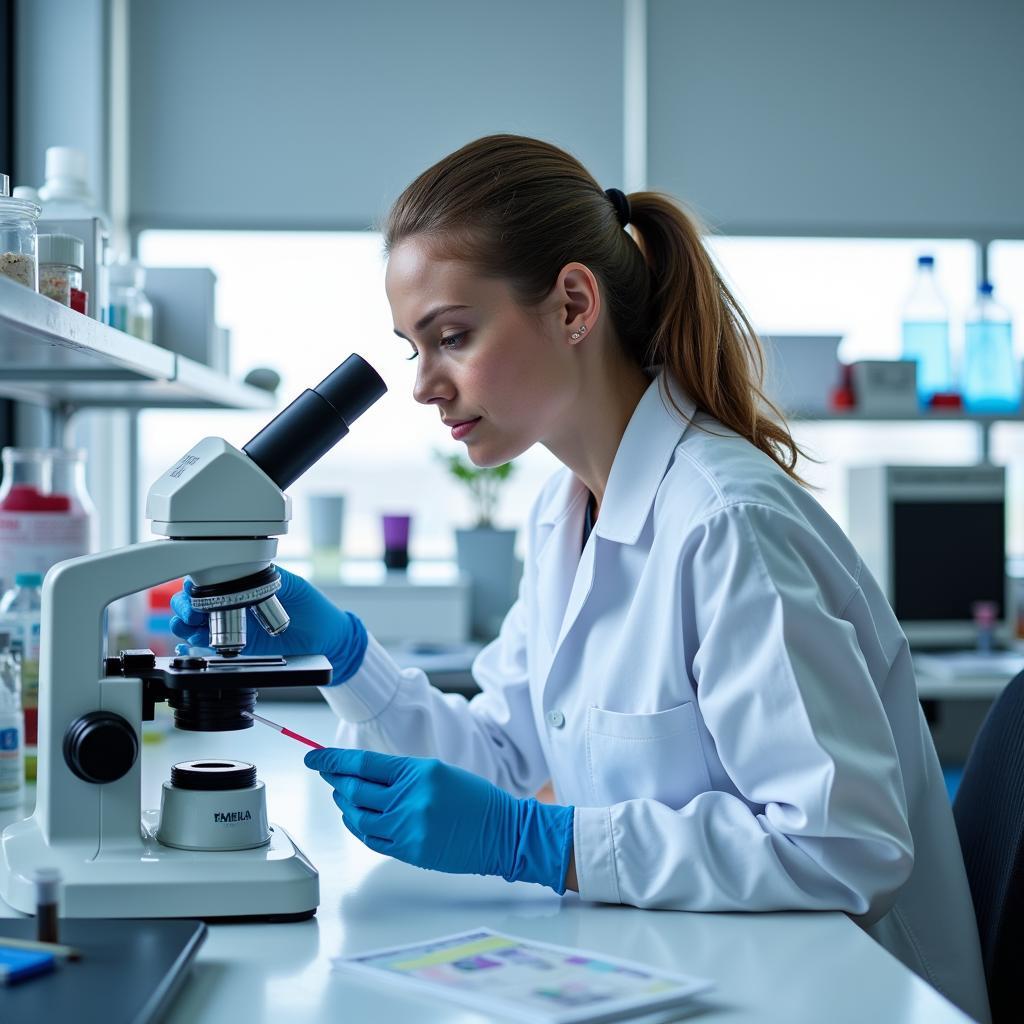The world of biomedical science is rapidly evolving, opening doors to a vast array of career paths. For those seeking a dynamic and fulfilling career path within a hospital setting, biomedical science jobs offer the opportunity to combine your passion for science with a direct impact on patient care and medical advancements. But what exactly do these jobs entail, and what skills and qualifications are needed to succeed? This comprehensive guide delves into the diverse landscape of Biomedical Science Jobs In Hospitals, providing valuable insights to guide your career journey.
Unraveling the World of Biomedical Science in Hospitals
Biomedical science encompasses a wide range of disciplines that apply biological and physiological principles to clinical practice. Professionals in this field play a crucial role in bridging the gap between scientific research and patient care. They are involved in various aspects of healthcare, from diagnosing and treating diseases to developing new medical technologies and therapies.
 Biomedical scientist analyzing samples in a hospital laboratory
Biomedical scientist analyzing samples in a hospital laboratory
In-Demand Biomedical Science Jobs in Hospitals
The demand for skilled biomedical scientists continues to grow as hospitals strive to provide cutting-edge patient care. Let’s explore some of the most sought-after biomedical science jobs:
1. Biomedical Scientist
Biomedical scientists are the backbone of hospital laboratories, responsible for analyzing patient samples, such as blood, tissue, and fluids. Their work is essential for diagnosing diseases, monitoring treatment effectiveness, and conducting research.
2. Medical Laboratory Technician
Medical laboratory technicians work closely with biomedical scientists, performing a variety of laboratory tests and procedures. They play a crucial role in ensuring accurate and timely results, contributing significantly to patient diagnosis and treatment.
3. Research Scientist
Research scientists in hospitals are at the forefront of medical discovery, designing and conducting clinical trials, analyzing data, and publishing research findings. Their work contributes to the development of new treatments, diagnostic tools, and preventive measures.
 Research scientist reviewing clinical trial data on a computer
Research scientist reviewing clinical trial data on a computer
4. Clinical Technologist
Clinical technologists specialize in specific areas of laboratory testing, such as microbiology, hematology, or immunology. They operate sophisticated equipment, analyze results, and troubleshoot technical issues, ensuring the accuracy and reliability of laboratory data.
5. Bioinformatician
As healthcare increasingly relies on data analysis, the role of bioinformaticians has become vital. They develop and apply computational tools to analyze biological data, supporting research efforts, personalized medicine initiatives, and the development of new diagnostic and therapeutic approaches.
Essential Skills for Success in Biomedical Science
To thrive in the competitive field of biomedical science, aspiring professionals need a strong foundation in science, technology, and analytical thinking. Here are some essential skills:
- Strong Scientific Foundation: A solid understanding of biology, chemistry, and human physiology is crucial for interpreting data and understanding disease mechanisms.
- Analytical and Problem-Solving Skills: Biomedical scientists must be able to analyze complex data, identify patterns, and solve problems effectively.
- Technical Proficiency: Familiarity with laboratory equipment, techniques, and software is essential for performing accurate and reliable tests.
- Communication and Teamwork Skills: Effective communication and collaboration are key in a hospital setting where professionals from different disciplines work together.
- Attention to Detail and Accuracy: Precision and accuracy are paramount in biomedical science, as even small errors can have significant consequences.
Navigating Your Career Path
 Biomedical science students gaining practical experience in a university laboratory
Biomedical science students gaining practical experience in a university laboratory
Choosing a career path in biomedical science is an exciting journey. Here are some steps to guide you:
- Self-Assessment: Identify your interests, strengths, and career goals.
- Research and Exploration: Explore different biomedical science roles, their responsibilities, and required qualifications.
- Education and Training: Pursue relevant undergraduate and postgraduate degrees, such as a Bachelor of Science or Master of Science in Biomedical Science.
- Gain Practical Experience: Seek internships, volunteer opportunities, or shadowing experiences to gain hands-on experience in a hospital setting.
- Networking: Attend conferences, join professional organizations, and connect with professionals in the field to expand your network and stay updated on industry trends.
Conclusion
Biomedical science jobs in hospitals offer a rewarding and challenging career path for individuals passionate about science and its application in healthcare. By developing a strong scientific foundation, honing essential skills, and actively pursuing opportunities for growth, you can embark on a fulfilling career that makes a real difference in the lives of patients and contributes to advancements in medicine.
Frequently Asked Questions (FAQs)
1. What is the average salary for biomedical science jobs in hospitals?
Salaries can vary depending on factors such as location, experience, and specific job title. However, biomedical science professionals generally earn competitive salaries.
2. What are the career advancement opportunities in biomedical science?
With experience and further education, biomedical scientists can advance to senior positions, such as laboratory manager, research director, or pursue specialized roles in areas like genetics or immunology.
3. Are biomedical science jobs in high demand?
Yes, the demand for skilled biomedical scientists is consistently high due to the expanding healthcare industry and ongoing advancements in medical technology.
4. What are some reputable organizations for biomedical science professionals?
Organizations like the American Society for Clinical Pathology (ASCP) and the American Association for Clinical Chemistry (AACC) offer valuable resources, networking opportunities, and continuing education programs.
5. What advice would you give to someone interested in pursuing a career in biomedical science?
Focus on building a strong foundation in science, develop essential skills, and gain practical experience through internships or volunteer work. Networking and staying updated on industry trends are also crucial.
For any inquiries or assistance regarding career opportunities at San Jose Hospital, please contact our dedicated team at:
Phone: 02437655121
Email: [email protected]
Address: Số 298 Đ. Cầu Diễn, Minh Khai, Bắc Từ Liêm, Hà Nội, Việt Nam.
Our customer service team is available 24/7 to assist you.